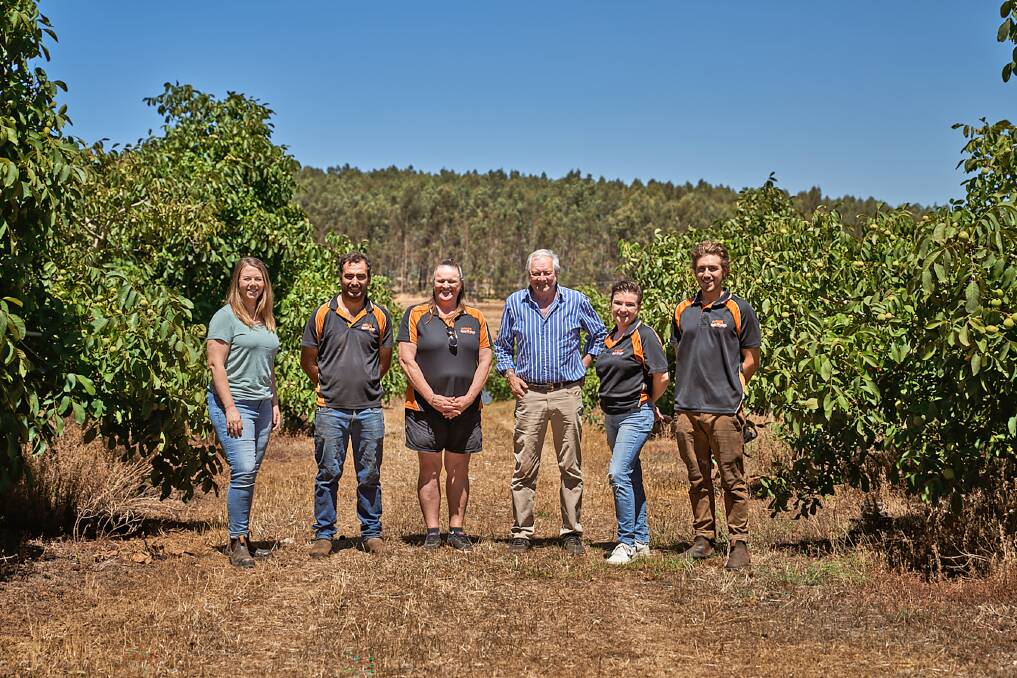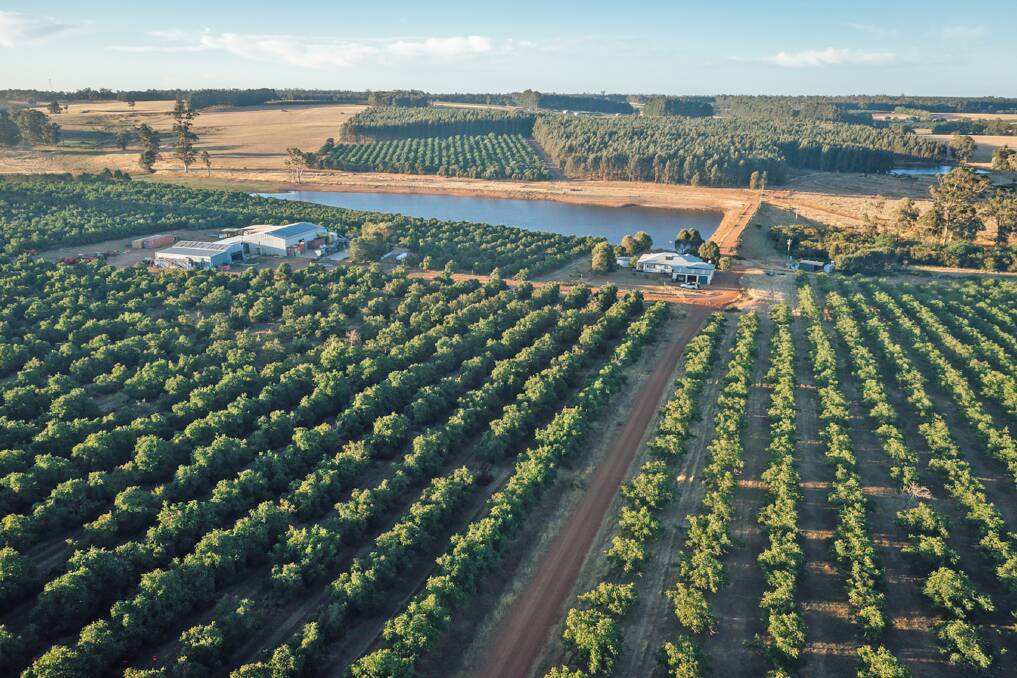
Manjimup and Nannup are a long way from the traditional walnut growing regions of Turkey, Iran and the United States, but the rainy climate makes it the perfect home for David and Noellene Williams' 64 hectares of various walnut trees.
Subscribe now for unlimited access to all our agricultural news
across the nation
or signup to continue reading
Their company, Omega Walnuts, is in the top five of walnut producers nationally and is Australia's largest grower of organic walnuts.
In 1999, the couple rang in the new century by purchasing a small farm in Nannup, on the banks of the Blackwood River, with a plan to grow trees for timber production.
However, the Shire of Nannup restricted their plan, downsizing their plantation proposal into an orchard.
The Williams purchased a larger farm in Manjimup in 2009, in partnership with the Foulds family, then waited six to seven years before their first harvest.
Grafting walnuts is an arduous task which involves taking a graft - also known as a scion - from a higher yielding variety and putting it onto stronger rootstock.
After purchasing the Manjimup farm, a grafting error led to the loss of 12,000 trees.
"It was a huge setback," Mr Williams said.
The Manjimup farm features a fully developed processing centre, sorting the nuts into 250 gram packets or five kilogram bags, of either conventional or organically grown product.
Factory seconds and walnuts that don't have the correct colouring go to bakeries.
Becoming a certified organic grower is a three-year process, for which both orchards now qualify.
However, the Williams use both conventional and organic practices in their orchards.
Their trees also sequester 500 tonnes of carbon each year.
Mr Williams said using conventional methods offered higher yields, but being able to offer an organic product gave them exposure to new markets in the Eastern States.

The couple is very excited about a new product, coming before the end of the year.
The new walnut oil will add something a bit different to the Omega Walnuts product range.
Walnut kernels are between 60-70 per cent oil and are high in Omega 3 and 6.
Once the oil is extracted from the kernel, it's left to sit and separate largely into what is used as a cooking oil.
The remaining 10pc is used as a salad oil.
"That 10pc is a much richer colour and has a nuttier flavour," Mr Williams said.
"It's just marvellous to cook with, it's a nice, subtle cooking oil that heats up to about 160 degrees."
The walnut oil will be processed in Queensland, but Mr Williams has been working on bringing nut oil production to WA, not only for Omega Walnuts, but to make available to other nut growers.
The property in Nannup was originally used to run cattle, while Manjimup was used to grow fruit and vegetables.
"The sort of soil you're after is karri loam soil, and you don't want too much clay, which is one of the problems with the area at Manjimup, but the rest of it is pretty good," Mr Williams said.
"Walnuts are a very tough tree."
Walnut trees required a lot of husbandry, he said.

Walnut trees lose much of their nutrients and energy during fruit production, which needs to be replaced.
The trees are also dormant for one to two months a year.
They need to be pruned regularly, allowing for as much sunlight to reach the inner parts of the tree as possible.
"We do regular soil and leaf tests, which analyse what the tree might be short of or have too much of," Mr Williams said.
"Our inputs are tailor-made to try to give the tree that balance, that's either done by foliar spray or goes out in the fertigation system in the ground."
Harvest is a simple mechanical process.
A machine goes along to shake all the walnuts off the branches, another machine brushes the nuts into the rows and a third machine - Mr Williams likened it to a golf ball collector - picks them up from the rows.
Walnut blight is one of the biggest threats to walnuts, globally.
It's an airborne or waterborne pathogen which attacks the leaf and fruit.
Traditionally it's treated with a mixture of copper and Mancozeb, however in the organic orchards, there's a limit to how much copper can be used.
To minimise this, Omega Walnuts is assisted by an Eastern States' biology company, where Mr Williams' son works.
"You try and occupy the tree first, so when the walnut blight pathogen comes along there's no home for it," Mr Williams said.

Like any kind of farming, the elements are always more of a concern.
Years ago, torrential rain drenched the orchards just before harvest, burying the fallen nuts in the mud and making it difficult for the harvester to pick them up.
"I think we left about 30 tonnes on the orchard floor, which was really sad," Mr Williams said.
"And every year there's some new canker that comes into a part of the orchard."
Despite these challenges, Omega Walnuts is stocked in more than 100 stores across WA.
The business is constantly expanding and upgrading, as the Williams are dedicated to research and development.
The next area of improvement at the processing facility will be the cracking method.
Omega Walnuts uses a two-step cracking process to prevent damaging the pellicle, which is a thin translucent layer which prevents the walnut oil from oxidising and making the nuts bitter.
"We're searching to improve our cracking process to speed it up and have less labour on the cracking table," Mr Williams said.
"One of the drawbacks to our cracking process is that we have less halves, so we lose appearance for taste."
The science and attention to detail makes it sound like the family has been involved in agriculture or agronomy their whole lives, but prior to the move down south, the couple lived in Perth and worked in business there.
"Noellene is much closer to the growing than me, she's a naturally good grower," Mr Williams said.
"I used to be a lawyer and was chairman of the WA Cricket Association.
"We really enjoyed country living," he said.
Mr Williams also owned short stay accommodation as well as pubs across Australia, so while he was new to the world of agriculture and horticulture, he was well-rounded in business.
Starting out with the small orchard in Nannup gave them a template to expand.
"We've got a very good orchard manager too, he's been important," Mr Williams said.
"Growing things is terribly hard, those in the city don't realise how hard it is."


